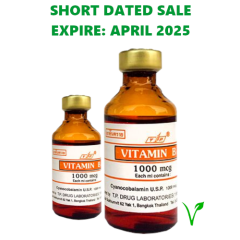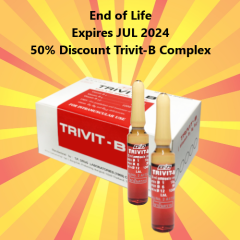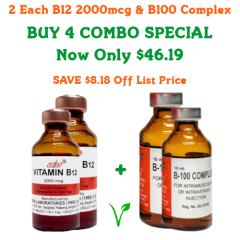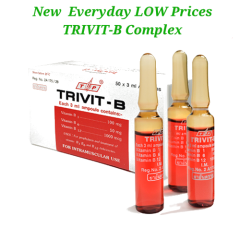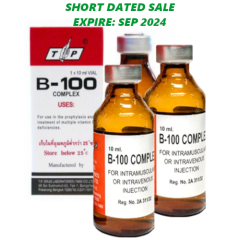Are you getting enough Vitamin B12 from the foods you eat?
Are you getting enough Vitamin B12 from the foods you eat?
Vitamin B12, also known as Cobalamin, is the largest and most complex vitamin that exists. It can be consumed in large doses because any excess is eliminated by the body but is also stored in the liver for up to a year to be used when supplies are low. Certain foods, if prepared properly and consumed in adequate quantities, can provide some individuals enough B vitamins to keep them in good health. Medical studies have shown that a greater number of people don't get enough B vitamins strictly from eating B-rich foods. Ten to thirty percent of older people may not absorb vitamin B12 well. A healthy lifestyle should include a diet that includes as much B vitamins as possible.
For your body to achieve maximum health, you must be sure to consume ample amounts of vitamin B rich foods. By eating a balanced diet containing many produce and whole grains, it’s fairly easy to get most B vitamins, but vitamin B12 is another story. Vitamin B12, which is found naturally only in animal sources, stimulates healthy nerve function, assists your body in producing DNA, red blood cells and supports your immune system.
If you don’t consume meat or dairy you can have trouble reaching the daily-recommended 2.4 micrograms, and if you're pregnant that’s 2.6 mcg or 2.8 mcg if you're breastfeeding. If you are experiencing celiac disease or you’re older than 50, you are also at risk for deficiency. Not absorbing sufficient amounts of B12 can cause fatigue, weakness and lightheadedness. See your doctor if you are eating the appropriate foods and are experiencing such symptoms.
Experiencing B12 deficiencies can wreak havoc on your health. Even a small deficiency of vitamin B12 can lead to depression, fatigue, mania and anemia. Long-term deficiencies can cause permanent brain damage and can severely affect the central nervous system. Natural occurring vitamin B12 is only made by bacteria and is only found naturally in animal products, however, synthetic forms such as cyanocobalamin have been made by numerous global laboratories and are widely available and added to many foods.
Foods high in Vitamin B12 include shellfish, fish, crab and liver, red meat, fortified soy products (soymilk and tofu), low fat dairy, cheese, eggs and fortified cereals.
Here is a sampling list of specific food groups that are rich in B12:

Ready to eat high-level B12 cereals such as Kellogg’s Product 19; Legumes and Legume Products such as Loma Linda’s vegie-Burger or veggie Sausage and Silk Brand plain soy milk. Finfish and Shellfish products such as mollusks, oysters, octopus, mussels, King mackerel and Alaska King Crab. Poultry Products such as Goose (liver), duck, turkey, chicken and emu; Beef products such as chuck, shoulder and round steak as well as by-Products like liver, brain, pancreas, spleen and lung. Most pork products and by-products like the liver, spleen, lungs, brain and pancreas. Some Dairy and Egg Products like duck eggs milk and plain yogurt, Ethnic Foods such as wild Alaskan Moose, Trout, Salmon and Caribou.
Maintaining the recommended minimum daily allowance (RMDA) does not ensure the fact that you are receiving the adequate amount of B vitamins, specifically vitamin B12. You should take great care in assuring yourself that you are getting enough B12 in the foods that you consume. Not doing so could seriously affect your physical and mental health.
For your body to achieve maximum health, you must consume ample amounts of vitamin B rich foods. By eating a balanced diet containing many produce and whole grains, it’s normally not to hard get most B vitamins from a vitamin B rich diet. However, vitamin B12 is another story.
Vitamin B12, which is found naturally only in animal sources, stimulates healthy nerve function, assists your body in producing DNA, red blood cells and supports your immune system. If you don’t consume meat or dairy you can have trouble reaching the daily-recommended 2.4 micrograms, if you're pregnant that’s 2.6 mcg and 2.8 mcg if you're breastfeeding.
If you are experiencing celiac or Crohn's disease, are older than 50, you are also at risk for deficiency. Those who have had gastrointestinal surgeries are also at risk form malabsorption.
Not absorbing sufficient amounts of B12 can cause fatigue, weakness, lightheadedness and many more severe symptoms. See your doctor if you are eating the appropriate foods and are experiencing the symptoms of a B12 deficiency.
SHOP NOW for Vitamin B-12 injections

